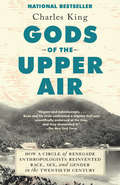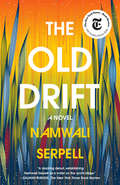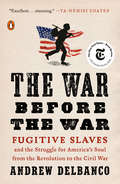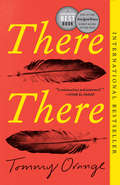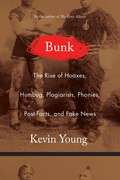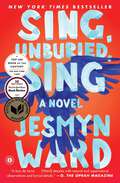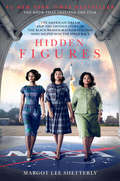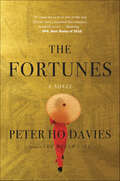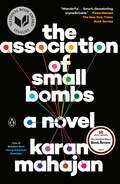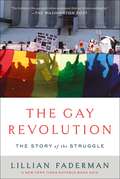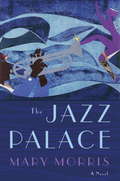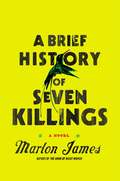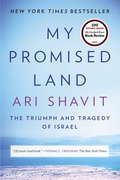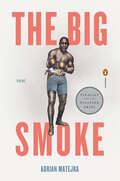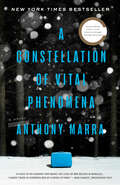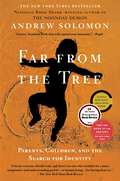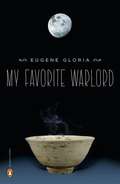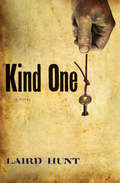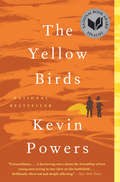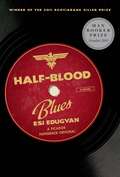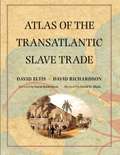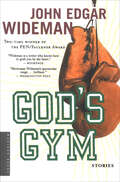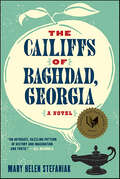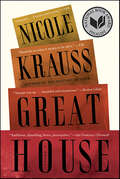Special Collections
Anisfield-Wolf Book Award
Description: The Anisfield-Wolf Book Award recognizes books that make important contributions to understanding racism and help develop an appreciation of the rich diversity of human cultures. #award
- Table View
- List View
Gods of the Upper Air
by Charles KingNEW YORK TIMES BESTSELLER2020 Anisfield-Wolf Book Award WinnerFinalist for the National Book Critics Circle AwardFrom an award-winning historian comes a dazzling history of the birth of cultural anthropology and the adventurous scientists who pioneered it—a sweeping chronicle of discovery and the fascinating origin story of our multicultural world.A century ago, everyone knew that people were fated by their race, sex, and nationality to be more or less intelligent, nurturing, or warlike. But Columbia University professor Franz Boas looked at the data and decided everyone was wrong. Racial categories, he insisted, were biological fictions. Cultures did not come in neat packages labeled "primitive" or "advanced." What counted as a family, a good meal, or even common sense was a product of history and circumstance, not of nature. In Gods of the Upper Air, a masterful narrative history of radical ideas and passionate lives, Charles King shows how these intuitions led to a fundamental reimagining of human diversity. Boas's students were some of the century's most colorful figures and unsung visionaries: Margaret Mead, the outspoken field researcher whose Coming of Age in Samoa is among the most widely read works of social science of all time; Ruth Benedict, the great love of Mead's life, whose research shaped post-Second World War Japan; Ella Deloria, the Dakota Sioux activist who preserved the traditions of Native Americans on the Great Plains; and Zora Neale Hurston, whose studies under Boas fed directly into her now classic novel, Their Eyes Were Watching God. Together, they mapped civilizations from the American South to the South Pacific and from Caribbean islands to Manhattan's city streets, and unearthed an essential fact buried by centuries of prejudice: that humanity is an undivided whole. Their revolutionary findings would go on to inspire the fluid conceptions of identity we know today. Rich in drama, conflict, friendship, and love, Gods of the Upper Air is a brilliant and groundbreaking history of American progress and the opening of the modern mind.
The Old Drift
by Namwali SerpellAn electrifying debut from the winner of the 2015 Caine Prize for African writing, The Old Drift is the Great Zambian Novel you didn’t know you were waiting for
On the banks of the Zambezi River, a few miles from the majestic Victoria Falls, there was once a colonial settlement called The Old Drift. Here begins the epic story of a small African nation, told by a mysterious swarm-like chorus that calls itself man’s greatest nemesis.
The tale? A playful panorama of history, fairytale, romance and science fiction.
The moral? To err is human.
In 1904, in a smoky room at the hotel across the river, an Old Drifter named Percy M. Clark, foggy with fever, makes a mistake that entangles the fates of an Italian hotelier and an African busboy.
This sets off a cycle of unwitting retribution between three Zambian families (black, white, brown) as they collide and converge over the course of the century, into the present and beyond.
As the generations pass, their lives – their triumphs, errors, losses and hopes – form a symphony about what it means to be human.
From a woman covered with hair and another plagued with endless tears, to forbidden love affairs and fiery political ones, to homegrown technological marvels like Afronauts, microdrones and viral vaccines – this gripping, unforgettable novel sweeps over the years and the globe, subverting expectations along the way.
Exploding with color and energy, The Old Drift is a testament to our yearning to create and cross borders, and a meditation on the slow, grand passage of time.
The War Before the War
by Andrew DelbancoThe devastating story of how fugitive slaves drove the nation to Civil War
For decades after its founding, America was really two nations--one slave, one free. There were many reasons why this composite nation ultimately broke apart, but the fact that enslaved black people repeatedly risked their lives to flee their masters in the South in search of freedom in the North proved that the "united" states was actually a lie.
Fugitive slaves exposed the contradiction between the myth that slavery was a benign institution and the reality that a nation based on the principle of human equality was in fact a prison-house in which millions of Americans had no rights at all. By awakening northerners to the true nature of slavery, and by enraging southerners who demanded the return of their human "property," fugitive slaves forced the nation to confront the truth about itself.
By 1850, with America on the verge of collapse, Congress reached what it hoped was a solution-- the notorious Compromise of 1850, which required that fugitive slaves be returned to their masters. Like so many political compromises before and since, it was a deal by which white Americans tried to advance their interests at the expense of black Americans.
Yet the Fugitive Slave Act, intended to preserve the Union, in fact set the nation on the path to civil war. It divided not only the American nation, but also the hearts and minds of Americans who struggled with the timeless problem of when to submit to an unjust law and when to resist. The fugitive slave story illuminates what brought us to war with ourselves and the terrible legacies of slavery that are with us still.
There There
by Tommy OrangeHere is a voice we have never heard--a voice full of poetry and rage, exploding onto the page with stunning urgency and force.
Here is a story of several people, each of whom has private reasons for travelling to the Big Oakland Powwow.
Jacquie Red Feather is newly sober and trying to make it back to the family she left behind in shame.
Dene Oxendene is pulling his life together after his uncle's death and has come to work at the powwow to honour his uncle's memory.
Opal Viola Victoria Bear Shield has come to watch her nephew Orvil Red Feather, who has taught himself traditional Indian dance through YouTube videos and has come to the powwow to dance in public for the very first time.
There will be glorious communion, and a spectacle of sacred tradition and pageantry. And there will be sacrifice, and heroism, and unspeakable loss.
Fierce, angry, funny, heartbreaking, There There is a relentlessly paced multi-generational story about violence and recovery, memory and identity, and the beauty and despair woven into the history of a nation and its people. A glorious, unforgettable debut.
Bunk
by Kevin YoungYoung finds that faker is woven from stereotype and suspicion, race being the most insidious American hoax of all.
Sing, Unburied, Sing
by Jesmyn WardA searing and profound Southern odyssey by National Book Award winner Jesmyn Ward.
In Jesmyn Ward’s first novel since her National Book Award–winning Salvage the Bones, this singular American writer brings the archetypal road novel into rural twenty-first-century America. Drawing on Morrison and Faulkner, The Odyssey and the Old Testament, Ward gives us an epochal story, a journey through Mississippi’s past and present that is both an intimate portrait of a family and an epic tale of hope and struggle. Ward is a major American writer, multiply awarded and universally lauded, and in Sing, Unburied, Sing she is at the height of her powers.
Jojo and his toddler sister, Kayla, live with their grandparents, Mam and Pop, and the occasional presence of their drug-addicted mother, Leonie, on a farm on the Gulf Coast of Mississippi. Leonie is simultaneously tormented and comforted by visions of her dead brother, which only come to her when she’s high; Mam is dying of cancer; and quiet, steady Pop tries to run the household and teach Jojo how to be a man. When the white father of Leonie’s children is released from prison, she packs her kids and a friend into her car and sets out across the state for Parchman farm, the Mississippi State Penitentiary, on a journey rife with danger and promise.
Sing, Unburied, Sing grapples with the ugly truths at the heart of the American story and the power, and limitations, of the bonds of family. Rich with Ward’s distinctive, musical language, Sing, Unburied, Sing is a majestic new work and an essential contribution to American literature.
Hidden Figures
by Margot Lee ShetterlyThe phenomenal true story of the black female mathematicians at NASA whose calculations helped fuel some of America's greatest achievements in space. Soon to be a major motion picture starring Taraji P. Henson, Octavia Spencer, Janelle Monae, Kirsten Dunst, and Kevin Costner.
Before John Glenn orbited the earth, or Neil Armstrong walked on the moon, a group of dedicated female mathematicians known as "human computers" used pencils, slide rules and adding machines to calculate the numbers that would launch rockets, and astronauts, into space. Among these problem-solvers were a group of exceptionally talented African American women, some of the brightest minds of their generation.
Originally relegated to teaching math in the South's segregated public schools, they were called into service during the labor shortages of World War II, when America's aeronautics industry was in dire need of anyone who had the right stuff. Suddenly, these overlooked math whizzes had a shot at jobs worthy of their skills, and they answered Uncle Sam's call, moving to Hampton, Virginia and the fascinating, high-energy world of the Langley Memorial Aeronautical Laboratory.
Even as Virginia's Jim Crow laws required them to be segregated from their white counterparts, the women of Langley's all-black "West Computing" group helped America achieve one of the things it desired most: a decisive victory over the Soviet Union in the Cold War, and complete domination of the heavens.
Starting in World War II and moving through to the Cold War, the Civil Rights Movement and the Space Race, Hidden Figures follows the interwoven accounts of Dorothy Vaughan, Mary Jackson, Katherine Johnson and Christine Darden, four African American women who participated in some of NASA's greatest successes. It chronicles their careers over nearly three decades they faced challenges, forged alliances and used their intellect to change their own lives, and their country's future.
The Fortunes
by Peter Ho DaviesAn NPR Best Book of the Year: “The most honest, unflinching, cathartically biting novel I’ve read about the Chinese American experience.” —Celeste Ng, #1 New York Times–bestselling author of Our Missing HeartsWinner, Anisfield-Wolf Book Award * Winner, Chautauqua Prize *Finalist, Dayton Literary Peace Prize * A New York Times Notable Book * A Publishers Weekly Best Book of the YearSly, funny, intelligent, and artfully structured, The Fortunes recasts American history through the lives of Chinese Americans and reimagines the multigenerational novel through the fractures of immigrant family experience.Inhabiting four lives—a railroad baron’s valet who unwittingly ignites an explosion in Chinese labor; Hollywood’s first Chinese movie star; a hate-crime victim whose death mobilizes the Asian American community; and a biracial writer visiting China for an adoption—this novel captures and capsizes over a century of our history, showing that even as family bonds are denied and broken, a community can survive—as much through love as blood.“Intense and dreamlike . . . filled with quiet resonances across time.” —The New Yorker “Riveting and luminous . . . Like the best books, this one haunts the reader well after the end.” —Jesmyn Ward, National Book Award-winning author of Sing, Unburied, Sing“A moving, often funny, and deeply provocative novel about the lives of four very different Chinese Americans as they encounter the myriad opportunities and clear limits of American life . . . gorgeously told.” —Chang-rae Lee, Buzzfeed “A poignant, cascading four-part novel . . . Outstanding.” —David Mitchell, The Guardian
The Association of Small Bombs
by Karan MahajanFor readers of Mohsin Hamid, Dave Eggers, Arundhati Roy, and Teju Cole, The Association of Small Bombs is an expansive and deeply humane novel that is at once groundbreaking in its empathy, dazzling in its acuity, and ambitious in scope
When brothers Tushar and Nakul Khurana, two Delhi schoolboys, pick up their family’s television set at a repair shop with their friend Mansoor Ahmed one day in 1996, disaster strikes without warning. A bomb—one of the many “small” bombs that go off seemingly unheralded across the world—detonates in the Delhi marketplace, instantly claiming the lives of the Khurana boys, to the devastation of their parents. Mansoor survives, bearing the physical and psychological effects of the bomb.
After a brief stint at university in America, Mansoor returns to Delhi, where his life becomes entangled with the mysterious and charismatic Ayub, a fearless young activist whose own allegiances and beliefs are more malleable than Mansoor could imagine. Woven among the story of the Khuranas and the Ahmeds is the gripping tale of Shockie, a Kashmiri bomb maker who has forsaken his own life for the independence of his homeland.
Karan Mahajan writes brilliantly about the effects of terrorism on victims and perpetrators, proving himself to be one of the most provocative and dynamic novelists of his generation.
The Gay Revolution
by Lillian FadermanThe sweeping story of the modern struggle for gay, lesbian, and trans rights--from the 1950s to the present--based on amazing interviews with politicians, military figures, legal activists, and members of the entire LGBT community who face these challenges every day.
The fight for gay, lesbian, and trans civil rights--the years of outrageous injustice, the early battles, the heart-breaking defeats, and the victories beyond the dreams of the gay rights pioneers--is the most important civil rights issue of the present day. Based on rigorous research and more than 150 interviews, The Gay Revolution tells this unfinished story not through dry facts but through dramatic accounts of passionate struggles, with all the sweep, depth, and intricacies only an award-winning activist, scholar, and novelist like Lillian Faderman can evoke.
The Gay Revolution begins in the 1950s, when law classified gays and lesbians as criminals, the psychiatric profession saw them as mentally ill, the churches saw them as sinners, and society victimized them with irrational hatred. Against this dark backdrop, a few brave people began to fight back, paving the way for the revolutionary changes of the 1960s and beyond. Faderman discusses the protests in the 1960s; the counter reaction of the 1970s and early eighties; the decimated but united community during the AIDS epidemic; and the current hurdles for the right to marriage equality.
In the words of the eyewitnesses who were there through the most critical events, The Gay Revolution paints a nuanced portrait of the LGBT civil rights movement. A defining account, this is the most complete and authoritative book of its kind.
The Jazz Palace
by Mary MorrisAcclaimed author Mary Morris returns to her Chicago roots in this sweeping novel that brilliantly captures the dynamic atmosphere and the dazzling music of the Jazz Age.
In the midst of boomtown Chicago, two Jewish families have suffered terrible blows. The Lehrmans, who run a small hat factory, lost their beloved son Harold in a blizzard. The Chimbrovas, who run a saloon, lost three of their boys on the SS Eastland when it sank in 1915. Each family holds out hope that one of their remaining children will rise to carry on the family business. But Benny Lehrman has no interest in making hats. His true passion is piano--especially jazz.
At night he sneaks down to the South Side, slipping into predominantly black clubs to hear jazz groups play. One night he is called out and asked to "sit in" on a group. His playing is first-rate, and the other musicians are impressed. One of them, the trumpeter, a black man named Napoleon, becomes Benny's close friend and musical collaborator, and their adventures together take Benny far from the life he knew as a delivery boy. Pearl Chimbrova recognizes their talent and invites them to start playing at her family's saloon, which Napoleon dubs "The Jazz Palace."
But Napoleon's main gig is at a mob establishment, which doesn't take too kindly to freelancing. And as the '20s come to a close and the bubble of prosperity collapses, Benny, Napoleon, and Pearl must all make hard choices between financial survival and the music they love.
A Tale of Two Plantations
by Richard S. DunnRichard Dunn reconstructs the lives of three generations of slaves on a sugar estate in Jamaica and a plantation in Virginia, to understand the starkly different forms slavery took. Deadly work regimens and rampant disease among Jamaican slaves contrast with population expansion in Virginia leading to the selling of slaves and breakup of families.
A Brief History of Seven Killings
by Marlon JamesIn A Brief History of Seven Killings, Marlon James combines brilliant storytelling with his unrivaled skills of characterization and meticulous eye for detail to forge an enthralling novel of dazzling ambition and scope.
On December 3, 1976, just before the Jamaican general election and two days before Bob Marley was to play the Smile Jamaica Concert to ease political tensions in Kingston, seven gunmen stormed the singer’s house, machine guns blazing. The attack wounded Marley, his wife, and his manager, and injured several others. Little was officially released about the gunmen, but much has been whispered, gossiped and sung about in the streets of West Kingston. Rumors abound regarding the assassins’ fates, and there are suspicions that the attack was politically motivated.
A Brief History of Seven Killings delves deep into that dangerous and unstable time in Jamaica’s history and beyond. James deftly chronicles the lives of a host of unforgettable characters – gunmen, drug dealers, one-night stands, CIA agents, even ghosts – over the course of thirty years as they roam the streets of 1970s Kingston, dominate the crack houses of 1980s New York, and ultimately reemerge into the radically altered Jamaica of the 1990s. Along the way, they learn that evil does indeed cast long shadows, that justice and retribution are inextricably linked, and that no one can truly escape his fate.
Gripping and inventive, shocking and irresistible, A Brief History of Seven Killings is a mesmerizing modern classic of power, mystery, and insight.
Winner of the 2015 Man Booker Prize
My Promised Land
by Ari ShavitWINNER OF THE NATAN BOOK AWARD.
An authoritative and deeply personal narrative history of the State of Israel, by one of the most influential journalists writing about the Middle East today.
Not since Thomas L. Friedman's groundbreaking From Beirut to Jerusalem has a book captured the essence and the beating heart of the Middle East as keenly and dynamically as My Promised Land. Facing unprecedented internal and external pressures, Israel today is at a moment of existential crisis.
Ari Shavit draws on interviews, historical documents, private diaries, and letters, as well as his own family's story, illuminating the pivotal moments of the Zionist century to tell a riveting narrative that is larger than the sum of its parts: both personal and national, both deeply human and of profound historical dimension.
We meet Shavit's great-grandfather, a British Zionist who in 1897 visited the Holy Land on a Thomas Cook tour and understood that it was the way of the future for his people; the idealist young farmer who bought land from his Arab neighbor in the 1920s to grow the Jaffa oranges that would create Palestine's booming economy; the visionary youth group leader who, in the 1940s, transformed Masada from the neglected ruins of an extremist sect into a powerful symbol for Zionism; the Palestinian who as a young man in 1948 was driven with his family from his home during the expulsion from Lydda; the immigrant orphans of Europe's Holocaust, who took on menial work and focused on raising their children to become the leaders of the new state; the pragmatic engineer who was instrumental in developing Israel's nuclear program in the 1960s, in the only interview he ever gave; the zealous religious Zionists who started the settler movement in the 1970s; the dot-com entrepreneurs and young men and women behind Tel-Aviv's booming club scene; and today's architects of Israel's foreign policy with Iran, whose nuclear threat looms ominously over the tiny country.
As it examines the complexities and contradictions of the Israeli condition, My Promised Land asks difficult but important questions: Why did Israel come to be? How did it come to be? Can Israel survive? Culminating with an analysis of the issues and threats that Israel is currently facing, My Promised Land uses the defining events of the past to shed new light on the present. The result is a landmark portrait of a small, vibrant country living on the edge, whose identity and presence play a crucial role in today's global political landscape.
The Big Smoke
by Adrian MatejkaA finalist for both the Pulitzer Prize and the National Book Award in Poetry--a collection that examines the myth and history of the prizefighter Jack Johnson The legendary Jack Johnson (1878-1946) was a true American creation. The child of emancipated slaves, he overcame the violent segregationism of Jim Crow, challenging white boxers--and white America--to become the first African-American heavyweight world champion. The Big Smoke, Adrian Matejka's third work of poetry, follows the fighter's journey from poverty to the most coveted title in sports through the multi-layered voices of Johnson and the white women he brazenly loved. Matejka's book is part historic reclamation and part interrogation of Johnson's complicated legacy, one that often misremembers the magnetic man behind the myth.
A Constellation of Vital Phenomena
by Anthony MarraA haunting novel set in a nearly abandoned hospital in war-torn Chechnya that is both intimate and ambitious in scope. Eight-year-old Havaa, Akhmed, the neighbour who rescues her after her father's disappearance, and Sonia, the doctor who shelters her over 5 dramatic days in December 2004, must all reach back into their pasts to unravel the intricate mystery of coincidence, betrayal and forgiveness which unexpectedly binds them and decides their fate. In his bold debut, Anthony Marra proves that sometimes fiction can tell us the truth of the world far better, and far more powerfully, than any news story. You will not forget the world he creates--A Constellation of Vital Phenomena and its characters will haunt you long after you turn the final page.
Far from the Tree
by Andrew SolomonFrom the National Book Award-winning author of The Noonday Demon: An Atlas of Depression comes a monumental new work, a decade in the writing, about family.
In Far from the Tree, Andrew Solomon tells the stories of parents who not only learn to deal with their exceptional children but also find profound meaning in doing so. Solomon's startling proposition is that diversity is what unites us all.
He writes about families coping with deafness, dwarfism, Down syndrome, autism, schizophrenia, multiple severe disabilities, with children who are prodigies, who are conceived in rape, who become criminals, who are transgender. While each of these characteristics is potentially isolating, the experience of difference within families is universal, as are the triumphs of love Solomon documents in every chapter. All parenting turns on a crucial question: to what extent parents should accept their children for who they are, and to what extent they should help them become their best selves.
Drawing on forty thousand pages of interview transcripts with more than three hundred families, Solomon mines the eloquence of ordinary people facing extreme challenges. Whether considering prenatal screening for genetic disorders, cochlear implants for the deaf, or gender reassignment surgery for transgender people, Solomon narrates a universal struggle toward compassion. Many families grow closer through caring for a challenging child; most discover supportive communities of others similarly affected; some are inspired to become advocates and activists, celebrating the very conditions they once feared.
Woven into their courageous and affirming stories is Solomon's journey to accepting his own identity, which culminated in his midlife decision, influenced by this research, to become a parent. Elegantly reported by a spectacularly original thinker, Far from the Tree explores themes of generosity, acceptance, and tolerance--all rooted in the insight that love can transcend every prejudice.
This crucial and revelatory book expands our definition of what it is to be human.
My Favorite Warlord
by Eugene GloriaA third collection from an award-winning poet whose "gift is breathtaking" (Naomi Shihab Nye) The themes of identity, relationships, and the poet's sense of origin are at the heart of Eugene Gloria's rich and captivating new collection. The title poem weaves together Japan's sixteenth-century warlord Hideyoshi with a meditation about the poet's father's dementia; "Here on Earth" embraces post-racial America and the speaker's own sense of displacement in the Midwest. In elegy and psalm, as well as ancient forms from Asia such as the haibun and pantoum, these elegant and passionate poems enact rage, civility, love, travel, and art as well as explore Gloria's own fears of frailty and erasure. .
Kind One
by Laird HuntAs a teenage girl, Ginny marries Linus Lancaster, her mother's second cousin, and moves to his Kentucky pig farm "ninety miles from nowhere."
In the shadows of the lush Kentucky landscape, Ginny discovers the empty promises of Linus' "paradise"--a place where the charms of her husband fall away to reveal a troubled man and cruel slave owner. Ginny befriends the young slaves Cleome and Zinnia who work at the farm--until Linus' attentions turn to them, and she finds herself torn between her husband and only companions.
The events that follow Linus' death change all three women for life. Haunting, chilling, and suspenseful, Kind One is a powerful tale of redemption and human endurance in antebellum America.
Laird Hunt is the author of several works of fiction and a finalist for the 2010 PEN Center USA Award in Fiction. Currently on the faculty of the University of Denver's creative writing program, he and his wife, the poet Eleni Sikelianos, live in Boulder, Colorado, with their daughter, Eva Grace.
The Yellow Birds
by Kevin PowersA novel written by a veteran of the war in Iraq, The Yellow Birds is the harrowing story of two young soldiers trying to stay alive.
"The war tried to kill us in the spring."
So begins this powerful account of friendship and loss. In Al Tafar, Iraq, twenty-one-year old Private Bartle and eighteen-year-old Private Murphy cling to life as their platoon launches a bloody battle for the city. Bound together since basic training when Bartle makes a promise to bring Murphy safely home, the two have been dropped into a war neither is prepared for.
In the endless days that follow, the two young soldiers do everything to protect each other from the forces that press in on every side: the insurgents, physical fatigue, and the mental stress that comes from constant danger.
As reality begins to blur into a hazy nightmare, Murphy becomes increasingly unmoored from the world around him and Bartle takes actions he could never have imagined.
With profound emotional insight, especially into the effects of a hidden war on mothers and families at home, The Yellow Birds is a groundbreaking novel that is destined to become a classic.
Half-blood Blues
by Esi Edugyan
Berlin, 1939.
The Hot Time Swingers, a popular jazz band, has been forbidden to play by the Nazis. Their young trumpet-player Hieronymus Falk, declared a musical genius by none other than Louis Armstrong, is arrested in a Paris café. He is never heard from again. He was twenty years old, a German citizen. And he was black. Berlin, 1952. Falk is a jazz legend. Hot Time Swingers band members Sid Griffiths and Chip Jones, both African Americans from Baltimore, have appeared in a documentary about Falk.
When they are invited to attend the film's premier, Sid's role in Falk's fate will be questioned and the two old musicians set off on a surprising and strange journey. From the smoky bars of pre-war Berlin to the salons of Paris, Sid leads the reader through a fascinating, little-known world as he describes the friendships, love affairs and treacheries that led to Falk's incarceration in Sachsenhausen.
Half-Blood Blues is a story about music and race, love and loyalty, and the sacrifices we ask of ourselves, and demand of others, in the name of art.
Winner of the Scotiabank Giller Prize
Man Booker Prize Finalist 2011,
Shortlisted for the Governor General's Literary Award for Fiction
Atlas of the Transatlantic Slave Trade
by David Eltis and David Richardson and James G. Basker and David Blight and David Brion DavisBetween 1501 and 1867, the transatlantic slave trade claimed an estimated 12. 5 million Africans and involved almost every country with an Atlantic coastline. In this extraordinary book, two leading historians have created the first comprehensive, up-to-date atlas on this 350-year history of kidnapping and coercion.
It features nearly 200 maps, especially created for the volume, that explore every detail of the African slave traffic to the New World. The atlas is based on an online database (www. slavevoyages. org) with records on nearly 35,000 slaving voyages--roughly 80 percent of all such voyages ever made.
Using maps, David Eltis and David Richardson show which nations participated in the slave trade, where the ships involved were outfitted, where the captives boarded ship, and where they were landed in the Americas, as well as the experience of the transatlantic voyage and the geographic dimensions of the eventual abolition of the traffic.
Accompanying the maps are illustrations and contemporary literary selections, including poems, letters, and diary entries, intended to enhance readers' understanding of the human story underlying the trade from its inception to its end.
This groundbreaking work provides the fullest possible picture of the extent and inhumanity of one of the largest forced migrations in history.
God's Gym
by John Edgar WidemanIn God's Gym, the celebrated author John Edgar Wideman offers stories that pulse with emotional electricity. The ten pieces here explore strength, both physical and spiritual. The collection opens with a man paying tribute to the quiet fortitude of his mother, a woman who "should wear a T-shirt: God's Gym." In the stories that follow, Wideman delivers powerful riffs on family and fate, basketball and belief. His mesmerizing prose features guest appearances by cultural luminaries as diverse as the Harlem Globetrotters, Frantz Fanon, Thelonious Monk, and Marilyn Monroe. As always, Wideman astounds with writing that moves from the intimate to the political, from shock to transcendence.
The Cailiffs of Baghdad, Georgia
by Mary Helen StefaniakA hidden history of the South emerges when a worldly teacher leads Threestep, GA, to reinvent itself, setting in motion events that lead to triumph and tragedy for the black teenager who happens to be the smartest person in Piedmont County, Georgia, in 1938–39.As an epigraph from The Souls of Black Folk by W. E. B. Du Bois reminds us at the start of this novel, "Throughout history, the powers of single black men flash here and there like falling stars, and die sometimes before the world has rightly gauged their brightness."Protagonist Theo Boykin is a genius, an artist, an inventor, a Leonardo DaVinci–type, whose talents are sought after by local blacks and whites alike, but even this is not enough to save him. He falls victim to "the tragedy of ignorance and the damage caused by fear," in the words of poet Rita Dove—the first African American to serve as U.S. Poet Laureate and a member of the jury that conferred on The Cailiffs of Baghdad, Georgia the 2011 Anisfield-Wolf Award for books that "make a significant contribution to our understanding of racism and our appreciation for the diversity of human cultures."You won't forget Theo Boykin, nor will you forget his friends the Cailiffs, especially Gladys, who tells this story with love and bewilderment, and the teacher, Miss Spivey, who changes all their lives.
Great House
by Nicole KraussNew York Times Bestseller • Finalist for the National Book Award • Winner of the Anisfield-Wolf Book Award • A Best Book of the Year as chosen by the New York Times (Notable), Seattle Times, San Francisco Chronicle, The Atlantic, St. Louis Post Dispatch, The Oregonian, and Book Page. "Masterful…Evocative and moving." —NPRFor twenty-five years, a reclusive American novelist has been writing at the desk she inherited from a young Chilean poet who disappeared at the hands of Pinochet’s secret police; one day a girl claiming to be the poet’s daughter arrives to take it away, sending the writer’s life reeling. Across the ocean, in the leafy suburbs of London, a man caring for his dying wife discovers, among her papers, a lock of hair that unravels a terrible secret. In Jerusalem, an antiques dealer slowly reassembles his father’s study, plundered by the Nazis in Budapest in 1944.Connecting these stories is a desk of many drawers that exerts a power over those who possess it or have given it away. As the narrators of Great House make their confessions, the desk takes on more and more meaning, and comes finally to stand for all that has been taken from them, and all that binds them to what has disappeared. Great House is a story haunted by questions: What do we pass on to our children and how do they absorb our dreams and losses? How do we respond to disappearance, destruction, and change?Nicole Krauss has written a soaring, powerful novel about memory struggling to create a meaningful permanence in the face of inevitable loss."This is a novel about the long journey of a magnificent desk as it travels through the twentieth century from one owner to the next. It is also a novel about love, exile, the defilements of war, and the restorative power of language." —National Book Award citation
